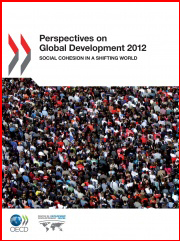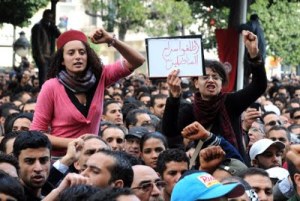Today’s post originally appeared on the OECD Insights Blog and is from Anne-Lise Prigent, editor in charge of development publications at OECD Publishing
A famous Deng Xiaoping quote goes : “Let some people get rich first”. Yet, in Spring 2011, the Beijing city authorities banned all outdoor advertisement of luxury goods on the grounds that they might contribute to a “politically unhealthy environment”.
The trouble with growth is that inequalities tend to rise with it. Growth does not necessarily translate into better life satisfaction – far from it, as the experience of Thailand or Tunisia shows. What happens when the fruits of growth are not shared, when people feel that income inequalities are rising and food prices soaring? Well, that’s when the so-called “politically unhealthy environment” sets in.
Millions voiced their frustration during the Arab Spring. From Tahrir square to the streets of Tunis, a huge emerging middle class showed that it has a tremendous capacity to mobilize people. It demands governments that are open and transparent, as well as more and better services. How can governments answer these demands? How can they go about redistributing the fruits of growth?
A new policy agenda is needed: one that focuses not only on growth but also on openness, fairness and inclusion. Social cohesion needs to be at the centre of policy making. Failing this, we may (re)enter a vicious circle where inequalities create a sense of injustice, which in turn can lead to (mass) protest and sometimes violence. As a result, social peace and stability, as well as long-term growth, may be jeopardized.
How can governments foster social cohesion? Perspectives on Global Development: Social Cohesion in a Shifting World from the OECD Development Centre, answers this. With this latest report, the Development Centre again proves that it is engaged with the world we live in, whether discussing tax revenues or the merits of football as a factor of social cohesion: having a sense of community can make a difference. That, along with equality of opportunities is what social cohesion is all about.
The report first shows how the world has undergone a shift of historical significance over the past decade, with the centre of economic gravity moving towards the East and South. The figures speak for themselves: in 2000, OECD countries represented around 60% of global GDP but by 2010 this was down to 51%, and it will be only 43% by 2030. In fast-growing economies, per capita growth rate was more than double that of high-income OECD countries over the last decade.
It is precisely this shifting wealth that opens a window of opportunity for development and social cohesion. In fast-growing economies, fiscal revenues rose from 20% of GDP on average in 2000 to 27% in 2008. These countries now have the (fiscal) resources to finance social policies that can make the difference – or, can they?
This report argues that public policies can make a difference. OECD countries with initially high income inequalities manage to redistribute income through taxes and transfers. The challenge is to leave no one behind. A cohesive society reduces inequality between groups and ensures that all citizens – the poor, the middle-earners, and the rich – are socially included.
Over the last decade, hundreds of millions of people were lifted out of poverty. This report argues that the emerging middle class should not be ignored either. Today, nearly 1 billion out of the 2 billion people living on 10 to 100 dollars a day in the world – the global middle class – live in fast-growing countries. This number is projected to exceed 3 billion in 2030.
The emerging middle class is a critical economic and social actor because of its potential as an engine of growth, particularly in the largest developing countries such as China and India. Its contribution to social cohesion can be high, and its expectations are sharply rising. What is needed is a social contract between citizens and the state, which entails more and better services in exchange for paying taxes. This would foster a virtuous circle that boosts social cohesion as well as growth. Citizens are more willing to pay taxes in societies where they feel a sense of belonging. Fiscal policy is thus a good place to start.
As the report highlights, fiscal, social and employment policies should go hand in hand. With recent innovations in social protection, the poorest are covered by social assistance and the wealthy by either contribution-based or private alternatives. Yet, a considerable number of (informal) middle-class workers are stuck in the uncomfortable “missing middle” of coverage. More comprehensive social protection systems should protect all sections of the population.
Stronger labour market institutions are also needed. They should aim to create more “good” jobs and reduce the duality in labour markets – between standard and non-standard contracts or between formal and informal workers. This will be critical in reducing inequalities and fostering social cohesion.
A series of cross-cutting issues have to be addressed coherently as well, including education, gender equality, food policy, the integration of immigrants, and institutions.
As Albert Einstein once said, “Reality is merely an illusion, although a very persistent one”. Ignoring people’s desires and the reality in which they live is perilous. Technocratically good policies that do that just won’t work and giving space to dissenting voices is essential to the creation of a sustainable, socially cohesive society.
Social cohesion is a means for development as well as an end in itself. What if social cohesion were the 21st century’s holy grail? A holy grail that can only be attained with some long-term vision and commitment – and a smile. Failing that, there might be rough times ahead.
Useful links


